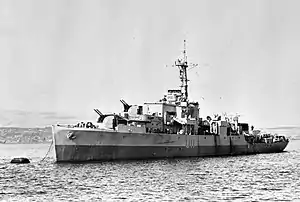HMS Lark (U11)
HMS Lark was a modified Black Swan-class sloop of the Royal Navy. She was laid down by Scotts Shipbuilding and Engineering Company, Greenock on 5 May 1942, launched on 28 August 1943 and commissioned on 10 April 1944, with the pennant number U11.[1]
 HMS Lark anchored in 1944. | |
| History | |
|---|---|
| Name: | Lark |
| Namesake: | Lark |
| Ordered: | 27 March 1941 |
| Builder: | Scotts Shipbuilding and Engineering Company, Greenock |
| Laid down: | 5 May 1942 |
| Launched: | 28 August 1943 |
| Commissioned: | 10 April 1944 |
| Decommissioned: | 17 February 1945 |
| Identification: | Pennant number: U11 |
| Fate: | Handed over to Soviet Navy |
| History | |
| Name: | Neptun |
| Namesake: | Neptun |
| Acquired: | June 1945 |
| Fate: | Scrapped in 1956 |
| General characteristics | |
| Class and type: | Modified Black Swan-class sloop |
| Displacement: | 1,350 tons |
| Length: | 283 ft (86 m) |
| Beam: | 38.5 ft (11.7 m) |
| Propulsion: |
|
| Speed: | 20 knots (37 km/h) at 4,300 hp (3,200 kW) |
| Complement: | 192 men + 1 Cat |
| Armament: |
|
Service in Royal Navy
Upon completion of her preparations in Tobermory, the Lark was deployed to defend convoys for Western Command.
Then in May and June 1944, he was part of the 114th Escort Group 114 with the sloop HMS Crane, HMS Blankney, HMS Chelmer and HMS Torrington to escort the assault convoys during the Allied landings in Normandy. during Operation Neptune.
Then he was assigned to protect arctic convoys (convoys JW61 to JW64 and RA61 to RA64) to supply the Russian front in Kola Bay.
On 17 February 1945, U-425 was sunk in the Barents Sea east of the Rybatchi Peninsula by depth charges from HMS Lark and HMS Alnwick Castle at the geographic position. The same day, at 10:15 a.m., the German submarine U-968 fired an acoustic torpedo at convoy RA64 and observed a hit after 6 minutes 20 seconds. In fact, HMS Lark was hit aft northeast of Murmansk so she was towed into Kola Bay and grounded near Rosta.[2]
HMS Lark was unequipped at Rosta because she was unable to return to the UK under tow. In June 1945, the carcass from which most of the equipment was removed was handed over to the Soviet Navy.
Service in Soviet Navy
Postwar reports suggest that she may have later been taken into Russian Navy under the name Neptun, but this has not been proven. It is unlikely that the hull was rebuilt and retooled for further use.[3]
References
- "HMS Lark (U 11) (British Sloop) - Ships hit by German U-boats during WWII - uboat.net". uboat.net. Retrieved 20 October 2020.
- "HMS Lark (U 11) (British Sloop) - Ships hit by German U-boats during WWII - uboat.net". uboat.net. Retrieved 20 October 2020.
- "HMS Lark, sloop". www.naval-history.net. Retrieved 20 October 2020.
Further readings
- Blackman, Raymond V. B. (1971). Jane's Fighting Ships 1971–72. London: Sampson Low, Marston & Company. ISBN 0-354-00096-9.
- Blair, Clay Gardiner (2000). Hitler's U-Boat War: The Hunted 1942–1945. Vol. 3. New York: Modern Library. ISBN 0-679-64033-9.
- Gardiner, Robert Gardiner (1980). Conway's All the World's Fighting Ships (1922-1946). Vol. 3. Conway Maritime Press. p. 456. ISBN 0-85177-146-7.
- Gardiner, Robert Gardiner (1996). Conway's All the World's Fighting Ships (1947-1995). Vol. 4. US Naval Institute Press. p. 675. ISBN 1-55750-132-7.
- Colledge, J. J.; Warlow, Ben (2006) [1969]. Ships of the Royal Navy: The Complete Record of all Fighting Ships of the Royal Navy (Rev. ed.). London: Chatham Publishing. ISBN 978-1-86176-281-8.
- Hague, Arnold (1993). Sloops: A History of the 71 Sloops Built in Britain and Australia for the British, Australian and Indian Navies 1926–1946. Kendal, England: World Ship Society. ISBN 0-905617-67-3.